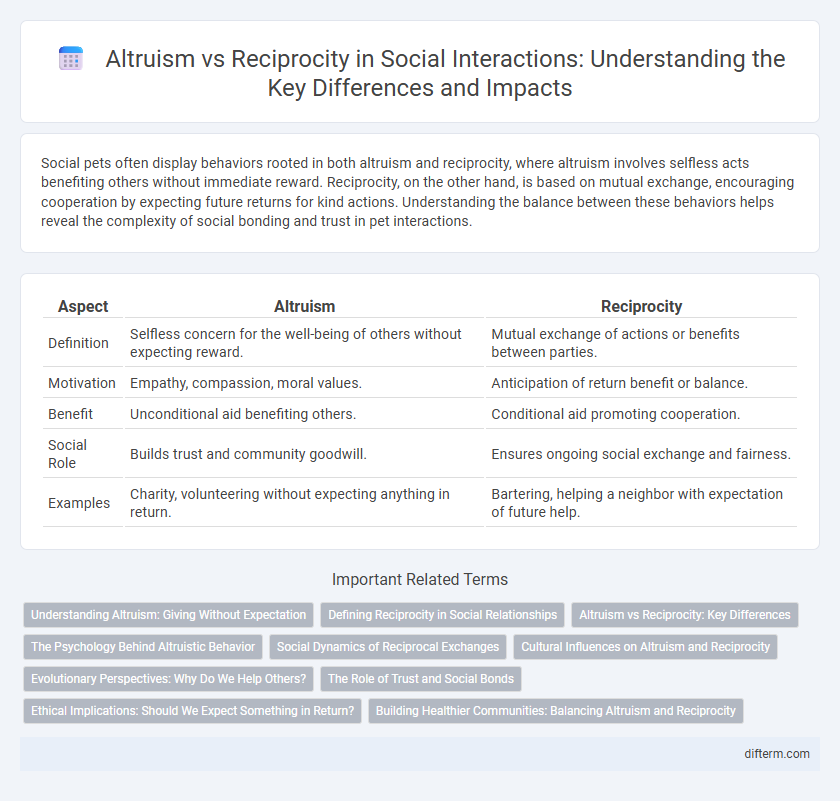Social pets often display behaviors rooted in both altruism and reciprocity, where altruism involves selfless acts benefiting others without immediate reward. Reciprocity, on the other hand, is based on mutual exchange, encouraging cooperation by expecting future returns for kind actions. Understanding the balance between these behaviors helps reveal the complexity of social bonding and trust in pet interactions.
Table of Comparison
| Aspect | Altruism | Reciprocity |
|---|---|---|
| Definition | Selfless concern for the well-being of others without expecting reward. | Mutual exchange of actions or benefits between parties. |
| Motivation | Empathy, compassion, moral values. | Anticipation of return benefit or balance. |
| Benefit | Unconditional aid benefiting others. | Conditional aid promoting cooperation. |
| Social Role | Builds trust and community goodwill. | Ensures ongoing social exchange and fairness. |
| Examples | Charity, volunteering without expecting anything in return. | Bartering, helping a neighbor with expectation of future help. |
Understanding Altruism: Giving Without Expectation
Altruism involves selfless acts where individuals provide help without expecting any form of return, emphasizing genuine concern for others' well-being. Unlike reciprocity, which is based on mutual exchange and future return, altruism prioritizes the immediate needs of others regardless of personal gain. Psychological studies highlight that altruistic behavior strengthens social bonds and promotes community resilience by fostering trust and cooperation.
Defining Reciprocity in Social Relationships
Reciprocity in social relationships involves the mutual exchange of actions or benefits, creating a cycle of give-and-take that strengthens social bonds. Unlike altruism, which is characterized by selfless concern for others without expecting anything in return, reciprocity is based on the anticipation of future benefits from others. This dynamic ensures cooperation and trust, serving as a foundational principle in maintaining long-term social connections.
Altruism vs Reciprocity: Key Differences
Altruism involves selfless concern for the well-being of others without expecting anything in return, emphasizing genuine acts of kindness. Reciprocity, on the other hand, is based on mutual exchange where actions are motivated by the expectation of returning benefits, fostering balanced social interactions. Understanding these distinctions is crucial in fields like psychology and sociology to analyze human behavior and social cooperation.
The Psychology Behind Altruistic Behavior
Altruistic behavior stems from complex psychological mechanisms involving empathy, moral values, and social bonding, which motivate individuals to help others without expecting direct rewards. Studies show that mirror neurons activate when witnessing others in need, fostering feelings of compassion that drive selfless acts. While altruism prioritizes genuine concern for others, reciprocity operates on a calculated exchange basis, highlighting distinct underlying motivational frameworks in social interactions.
Social Dynamics of Reciprocal Exchanges
Reciprocal exchanges drive social dynamics by fostering cooperation through mutual benefit, creating a cycle of give-and-take that enhances trust and social bonding. Unlike altruism, which involves selfless acts without expectation of return, reciprocity relies on the anticipation of future rewards, reinforcing social norms and stability within communities. Empirical studies reveal that balanced reciprocal interactions increase group cohesion and collective resilience in social networks.
Cultural Influences on Altruism and Reciprocity
Cultural influences significantly shape altruism and reciprocity by determining social norms and values that guide prosocial behavior across societies. In collectivist cultures, altruism often emphasizes group harmony and community well-being, whereas individualistic cultures may prioritize reciprocal exchanges as a basis for social interaction. Cross-cultural studies reveal variations in altruistic tendencies and reciprocity expectations, highlighting how cultural context affects motivations for helping and cooperation.
Evolutionary Perspectives: Why Do We Help Others?
Altruism and reciprocity are key concepts in evolutionary biology that explain helping behavior within social species. Altruism involves selfless acts that benefit others with no immediate personal gain, often driven by kin selection and inclusive fitness to promote the survival of shared genes. Reciprocity, on the other hand, is based on mutual exchange, where individuals help others expecting future returns, reinforcing cooperative behaviors through repeated interactions and social bonding.
The Role of Trust and Social Bonds
Trust functions as the foundation of altruism, encouraging individuals to act selflessly without expecting immediate returns. Strong social bonds enhance this trust, fostering a sense of community where altruistic behaviors thrive. In contrast, reciprocity relies on trust to ensure mutual exchanges, reinforcing social connections through balanced give-and-take interactions.
Ethical Implications: Should We Expect Something in Return?
Altruism embodies selfless concern for others without expecting anything in return, reinforcing ethical values of genuine kindness and moral integrity. Reciprocity, while promoting social cooperation through mutual exchange, raises ethical questions about conditional generosity and potential exploitation in relationships. Balancing these principles requires critical examination of whether moral actions should be motivated by inherent goodness or anticipated benefits.
Building Healthier Communities: Balancing Altruism and Reciprocity
Building healthier communities requires a balance between altruism and reciprocity, where selfless acts of kindness foster trust and cooperation among members. Altruism promotes unconditional support and strengthens social bonds, while reciprocity ensures mutual exchange, sustaining long-term relationships. Integrating both concepts encourages inclusive environments where individuals contribute positively, enhancing collective well-being and resilience.
altruism vs reciprocity Infographic

 difterm.com
difterm.com